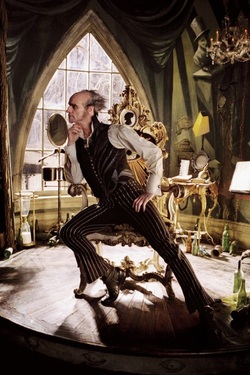 I saw, recently, that Lemony Snicket had been present at a local Portland bookstore, signing books. I missed the event. I was very intrigued to discover who this Lemony Snicket character might be. I understand that Daniel Hadler writes under the pen name, Lemony Snicket, but who shows up for a book signing when the author's name is Lemony Snicket? Would that be Daniel Hadler or someone acting the part of Lemony Snicket? Hmm. About ten of the students in the book club read "A Series of Unfortunate Events" book #1. It was a fast, easy read for these teenagers and even though they liked it, they were pretty quick to criticize, which here means finding fault. Most of them did not seem to understand the humorous technique that the author employs of using a somewhat difficult word and then defining it for the reader. Example: "Violet was sleeping fitfully - a word which here means "with much tossing and turning" - on the lumpy bed." (81). The high school students were highly critical of this technique, claiming that it felt patronizing, which here means talking down to. "But what about the humor?" I asked. "It's not funny," they claimed. "What about when he describes "adversity" as "Count Olaf"?" "Well, that was slightly hysterical, which here means extremely funny, but that was the only one." "Did you get that sometimes the definitions weren't quite right?" "Well, duh," they said, which here means that is really obvious and stupid. I have to admit that when a teenager says "duh," it's really difficult to come up with a witty comeback. After the discussion, I felt that these students were a bit too old for the book. Honestly, there seems to be a weird middle ground where teens are too old for middle grade books, and then they like them again when they're young adults. I'm not sure why this is except that perhaps we become more accepting when adults, a little less hyper critical, and we can acknowledge the humor without feeling condescended to, which here means patronized.
2 Comments
 On Thursday, November 21st, book club met to discuss our book choices for this month. We had chosen to read books from two different series: Divergent by Veronica Roth, and A Series of Unfortunate Events by Lemony Snicket. What we ended up discussing was why book series seem to be so popular and what to do when we hit on a good one. According to our discussion, the main reason book series seem so popular is that when students find something good, they stick with it. Isn't that the truth. If we go back to past series, ones that I would have read when I was a kid, The Narnia Chronicles, Anne of Green Gables, and The Little House on the Prairie all come to mind. I'm pretty sure that I read every Bobbsey Twins book I could find. We had The Hardy Boys, Nancy Drew, and The Lord of the Rings. These are great books and why would we read just one when the story leaves you hanging and when the development of those characters and that plot line are so powerful? Yes, we love series because when we find a really good book and well-developed characters, we have a hard time saying goodbye to them. Where does that leave us in our book club? The problem with a series in book club is that we have a difficult time reading just one book and then putting it aside. Students want to read the next book in the series and if we move on to a different choice, we might lose some of that initial enthusiasm for the book. And yet, the purpose of our teen book club is to discover books out there that really peak our interest. If we settle on one type of book and don't stretch ourselves to discover others, we are limiting our exposure to books, which is not the point of reading and discussing. The other issue with reading only one type of book is that sometimes that particular series doesn't work well with some of the readers in the club. They then become frustrated with our book selections and might discontinue their enrollment in the club or they might limit their comments. Definitely not what we'd like to see. So yes, we decided that reading the first book in a series is fine, but then the members of the club may need to read the next few in the series outside of the club. And we decided that's okay. Will we continue reading the Divergent Series and The Series of Unfortunate Events? Of course, but not in a group setting. For next month, we'll be reading Dicken's Oliver Twist. |
Chris Struyk-Bonn
I have had a few jobs in my life that I didn't enjoy: detassling corn, working in a small motor parts factory, framing pictures, serving food, and rejecting bad eggs in an egg factory. Today, I take part in a book club for teens and I love every minute of it. Archives
July 2015
Categories
All
|
 RSS Feed
RSS Feed
